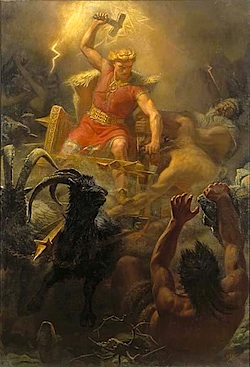A few years ago, when I was working up the basic story line for my new series which begins with Black Blade Blues, I wanted to do something different from the other urban fantasy I’d been reading. How could I stand out in the crowd? What I needed was to work with a mythos with that was under-represented in the field.
I’ve always been fascinated with mythos and religion. I remember reading Edith Hamilton’s Mythology as a kid and finding every bit of it fascinating. I especially loved how for the longest time, we as a species had gods that looked and acted just like us. I went through different phases of favorite mythos. They each had an appeal. Norse mythology, however, stuck with me as I began to think toward my own stories.
Norse mythology is so prevalent in our culture even the days of the week are named for Norse gods: Wednesday is Woden’s (Odin) Day, Thursday is Thor’s Day, Friday is Freya’s Day.
Odin and his crew were just like the rest of us with a few extraordinary exceptions. They got married, had kids, screwed around, got into fights and drank too much. They suffered from hubris and vanity among the many sins and vices portrayed in the epics and songs that have carried down from ancient times.
I’m a lover of story. Mostly SFF, with a bent toward fantasy. Of all the authors I’ve read in my life, Tolkien holds the top place in my heart. If the adventures on Barsoom and throughout Hyboria were my gateway drugs into fantasy; Middle-earth was where I stepped up to the hard stuff. Tolkien studied the lore and incorporated it into his story. Gandalf is Odin. The dwarves from The Hobbit are called out in the epics. Middle Earth is peppered with bits of Norse mythology. Tolkien took something he loved and worked it into his own vision.
It was time for me to do the same.
In the legends, Odin dresses up like a beggar and goes into the world to see what his people are up to. If he happens to bed a fair maiden here and there, more the better. Thor is the strongest of the lot, but he’s gullible and easily tricked by Loki. Loki, on the other hand, suffers from both envy and vanity. They are beautiful and flawed, anxious, melancholy, vengeful, jealous and loving. They are a bundle of emotional turmoil and foibles that mimic the people who worshipped them.
All of which makes them perfect story fodder.
I needed to flavor my characters with the nuances that permeated the lore. Sarah and her friends are classical heroes in the epic sense. They struggle in a world not of their making, fighting horrible odds, against opponents more powerful than they. How could I lose?
I listen to music when I write. Led Zeppelin has one song, “No Quarter,” that puts me into the mindset of the people who created these gods. I imagine the cold and the despair of those who wait for their loved ones to return. How the warriors who are fighting to get back home despair that they’ll never see their loved ones again. It’s a compelling and heart-breaking song. It reminds me that not too long ago we lived huddled together, praying we’d survive the winter wolves and the next snow storm.
Skalds from time-out-of-mind have told stories to get people through the long black nights. Imagine a world without the written word. Before television or movies, before electricity, running water or penicillin. Then imagine that there were things in the woods outside your hut that wanted to kill you and eat you. Now, it’s winter and the food’s running short. It’s another month until spring and you are going stir crazy locked in the hut where at least the wolves won’t eat you and there’s some heat.
This is where being a story teller makes you one of the most powerful and important people in existence. That’s who I want to be when I grow up—a skald that keeps the night at bay.
I want to instill in my readers a sense of that cold reality that permeates Norse mythology. I want them to see the world through the eyes of those who remember the days of tribulation and those who are discovering the harsh truth. It is a world of endless and frequently tragic possibilities.
J. A. Pitts resides in the Pacific Northwest where he hunts dragons, trolls and other beasties among the coffee shops and tattoo parlors.










